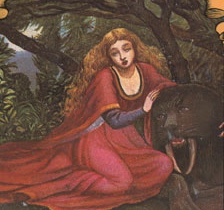All of us are exposed to stories in some form. We read fiction, watch movies, and have dreams. Chances are we first came into contact with stories as children who were read to or told stories as part of our daily lives. If we were encouraged (and sometimes even if not encouraged) we probably picked up books on our own once we could read. What not everyone is aware of is how important stories are to our mental health. Joseph Campbell, C. G. Jung and many other philosophers believed that stories, especially the myths and fairy tales upon which many of today’s books and movies are based, tell us basic truths about culture and the psyche. In short, they provide solutions for dealing with psychological problems.
The great thing about myths and fairy tales is that they tell these truths in a bare bones way that makes it easy for us to interpret and use the information contained in these stories. So as not to get deeply entrenched in the variety of truths myths and fairy tales provide us with, I will list a few of the more common and important ones.
1. Creation myths explore th creative instinct, patterns of renewal and the birth of consciousness in the human psyche.
2. Hero/Heroine Journeys are stories of individuation and overcoming great odds to become whole.
3. Tales of relationship and love describe the inner relationship we have to the masculine and feminine parts of our psyches. They also serve as a guide for how to go about uniting the active and analytical masculine aspect of the psyche with the more intuitive and receptive feminine.
4. The theme of encountering evil in fairy tales and myths help us understand the nature of evil in the world and how we relate to parts of ourself that we are unconscious of and are often destructive.
So, what do we do with stories other than just read them or watch them in the form of movies or tv shows? It is true that in simply being exposed to them we integrate a bit of information necessary for understanding our inner nature. But we can go a step beyond and try to relate to them consciously and in engaging them we can amplify the benefits stories can give us. What follows are some relatively simple ways to begin an exploration of stories and how specific themes might help you find solutions to habitual patterns and ways of being that are not constructive or healthy.
Think about all the fairy tales and myths you’ve been exposed to (you can think about movies and books as well but they are a little more convoluted) and pick one that feels special to you or that somehow describes a basic theme in your own life.
Is there a movie you like to watch again and again because when you see it you get a deep feeling of excitement or satisfaction? Is there a type of hero or heroine who most attracts you? How are you like them or how would incorporating some of their qualities enhance your life?
Is there a villain in fairy tales, a book or movie that particularly scares you? I knew a young woman who had recurring dreams about vampires and was interested in reading vampire stories. Upon exploring her associations with vampires, she felt they represented her abusive father and characteristics of him which she had internalized. In understanding this she was able to more consciously relate to this aspect of herself and to work with some of the psychological issues coming up around that.
Even if you don’t do any conscious work with stories, try noticing characters and stories in movies that attract you. Be aware of what makes you feel good in a story, what scares you and what excites you. If you want to go more in depth with this, read C. G. Jung’s Man and His Symbols, Joseph Campbell’s Myths to Live By, Gertrud Nelson’s Here All Dwell Free, and/or Jacoby, Kast, and Reidel’s Witches, Ogres and the Devil’s Daughter.
